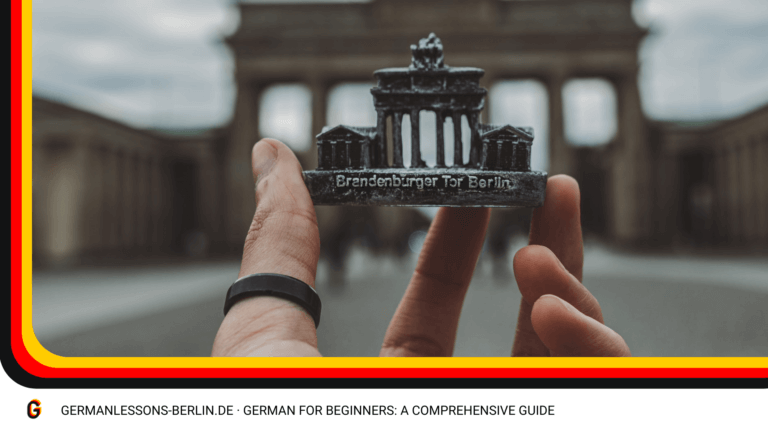I’ve tackled the challenge of German and discovered shortcuts to success along the way. In this article, I’ll share 12 essential tips that have helped me master basic German vocabulary. Whether it’s through flashcards or immersing in media, these strategies will boost your learning. So, if you’re ready to enhance your German skills with practical advice, let’s dive in and turn those daunting words into familiar friends!
Table of Contents
Key Takeaways
- Daily practice and consistency are crucial for retaining and progressing in German vocabulary.
- Effective use of flashcards, personalized with meaningful words and images, can make studying more engaging and productive.
- Engaging with German media, such as films, music, and news broadcasts, can accelerate vocabulary acquisition and comprehension skills.
- Utilizing mnemonic techniques, such as visual associations and rhyming words, can enhance vocabulary retention and make learning more enjoyable.
Embrace Daily Practice
Incorporating a few minutes of German vocabulary practice into my daily routine has proven indispensable for retention and progress. I’ve found that consistency is key; even on hectic days, I make sure to squeeze in at least five minutes of study. I use flashcards for quick sessions, focusing on high-frequency words to maximize the impact of my learning. I’ve also integrated German into my everyday life by labeling household items with their corresponding German names. This not only reinforces my memory but also helps me to think in German, making the language part of my daily thought process. I’ve noticed that this consistent, integrated approach has significantly improved my vocabulary recall and has made learning new words less daunting.
Utilize Flashcards Effectively
Regularly, I’ve found that utilizing flashcards can dramatically enhance my grasp of basic German vocabulary. They’re not just an effective tool for memorization—they’re my trusty sidekick in the thrilling adventure of language learning. Here’s how I use them to connect emotionally with the words:
- Personalize Your Deck:
- Create flashcards with words that resonate with your life or dreams.
- Use images that stir memories or aspirations, making each term more meaningful.
- Make It a Game
- Challenge yourself to beat your previous score, turning study sessions into an exciting quest for knowledge.
- Reward milestones with small treats, celebrating your progress and keeping motivation high.
This approach turns an ordinary study method into a heartfelt journey, making every flashcard a step closer to fluency.
Engage With German Media
Diving into German films, music, and news broadcasts, I’ve accelerated my vocabulary acquisition and comprehension skills. Exposing myself to the rhythm and intonation of native speakers through movies, I pick up colloquialisms and slang that textbooks often overlook. I’ve curated playlists of German songs, which not only enhance my listening abilities but also embed common phrases into my memory through catchy tunes. Regularly tuning into German news channels, I stay informed about current events while simultaneously practicing language comprehension. These media forms make learning engaging and contextual, allowing me to understand how words fit into everyday conversation. By consistently engaging with German media, I am immersing myself in the language, which is crucial for mastering vocabulary in a practical, enjoyable way.
Apply Mnemonic Techniques
Building on my experience with German media, I’ve found mnemonic techniques to be invaluable for cementing vocabulary in my memory. These clever tricks transform learning into a creative and enjoyable process. For example:
- Visual Associations
- Der Hund (the dog): Imagine a hound dog to remember Hund.
- Die Katze (the cat): Picture a cat sitting cozily on a mat to recall Katze.
- Rhyming Words
- Der Tisch (the table): Think of a dish on a table to link Tisch with dish.
- Das Haus (the house): Envision a mouse leaving a house to connect Haus with mouse.
Interact in German Communities
Participation in German-speaking communities offers me a practical arena to apply and expand my burgeoning vocabulary. Immersing myself in everyday conversations, I’m compelled to use the language actively, strengthening my recall and comprehension. Whether it’s chatting with native speakers online, joining a local Stammtisch, or participating in cultural events, these interactions are invaluable for picking up colloquial expressions and improving my pronunciation.
I’ve noticed that regular engagement with the community enhances my confidence and helps me think in German more naturally. It’s the real-world practice that textbooks can’t replicate. By making mistakes and learning from them in social settings, I’m continuously refining my linguistic skills. It’s clear that to truly grasp the essence of German, I must step out and interact.
Frequently Asked Questions
How Can I Measure My Progress in Mastering Basic German Vocabulary Effectively?
To gauge my progress in German, I often use flashcards and apps to track the words I’ve learned. I’ll test myself weekly, noting any improvement. Conversing with native speakers also helps me assess how well I’m picking up new vocabulary. I’ll make a point to incorporate recent words into our dialogues and see if I can understand their responses. It’s a practical way to measure my growing proficiency in the language.
What Role Does Understanding German Grammar Play in Learning Basic Vocabulary?
Understanding German grammar is crucial for learning vocabulary because it’s the framework that holds the language together. I’ve found that grasping grammar helps me use new words correctly and effectively. It’s not just about memorizing terms; it’s about knowing how to construct sentences and express myself clearly. With a solid grasp of grammar, I can ensure that the vocabulary I learn is both functional and meaningful in real-life conversations or writing.
Are There Any Mobile Apps Specifically Tailored for Tracking Vocabulary Learning Milestones in German?
Yes, there are mobile apps designed for tracking vocabulary learning milestones in German. I’ve used several that incorporate spaced repetition and quizzes to enhance retention. They’re convenient for setting daily goals and monitoring progress. Personally, these apps have been instrumental in broadening my German lexicon, making it easier to track my learning journey and stay motivated. It’s a practical approach to ensure steady improvement in mastering the language.
How Important Is It to Learn the Proper Pronunciation of Basic German Words, and What Resources Can Help With This?
Learning proper pronunciation in German is crucial; it ensures clear communication and helps avoid misunderstandings. I’ve found that listening to native speakers is invaluable. Language exchange meetups, German podcasts, and pronunciation tools like Forvo, where natives pronounce words, are resources I frequently use. I also practice with language learning apps that provide auditory examples, such as Duolingo or Babbel, to fine-tune my accent and make sure I’m understood when I speak.
Can Participating in Online Forums and Discussion Groups Be an Effective Way to Expand One’s Basic German Vocabulary, and if So, Which Platforms Are Recommended for Beginners?
Absolutely, joining online forums and discussion groups can boost my basic German vocabulary. Engaging with native speakers and fellow learners allows me to learn new words contextually and practice using them. For beginners, platforms like Duolingo forums, Reddit’s /r/German, and language exchange apps like Tandem are great. They offer a supportive community where I can ask questions, get feedback, and immerse myself in everyday German usage.
Conclusion
In conclusion, I’ve found that the key to mastering basic German vocabulary lies in daily practice, smart use of flashcards, immersing myself in German media, employing mnemonic tricks, and interacting with German-speaking communities. These strategies have made a world of difference in my learning journey. Stick with them and you’ll be amazed at how quickly your German skills can grow. Let’s keep pushing our boundaries and revel in the progress we make every day. Viel Erfolg!




